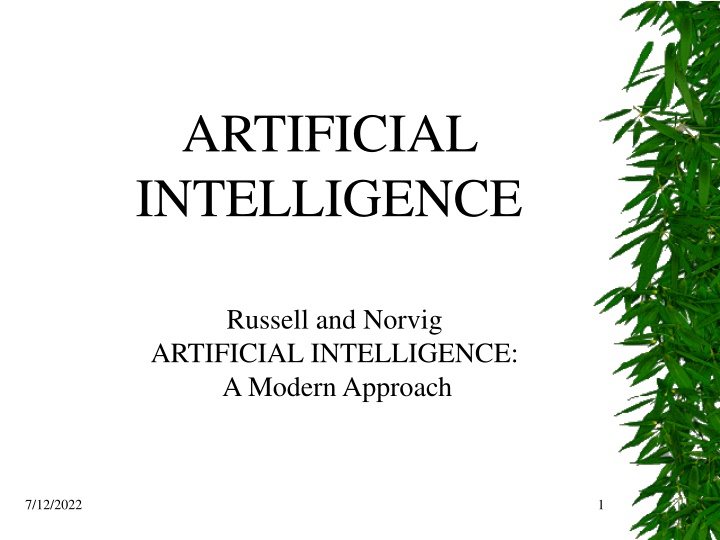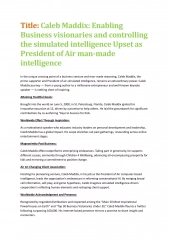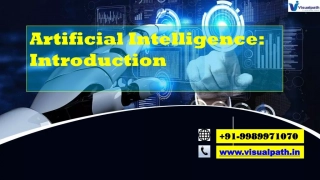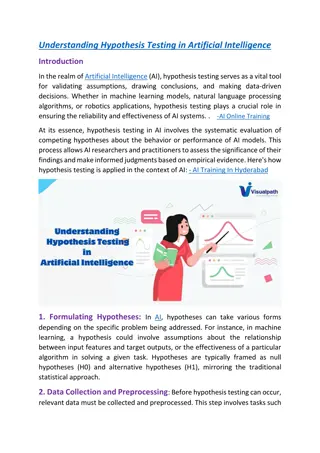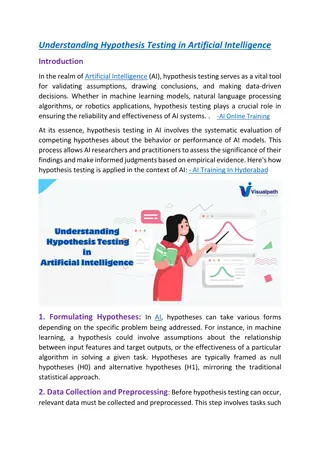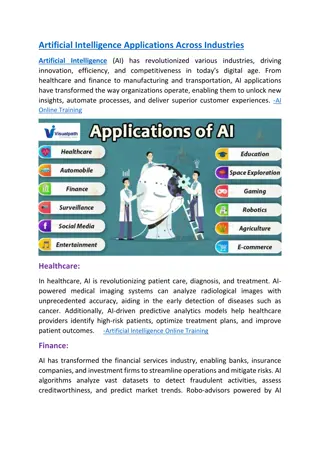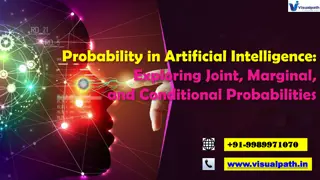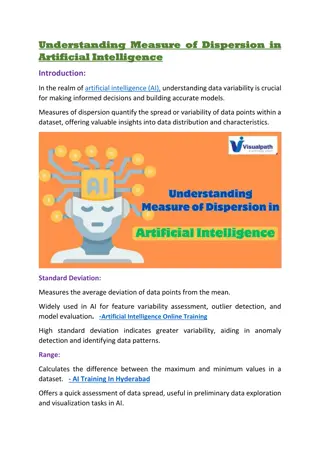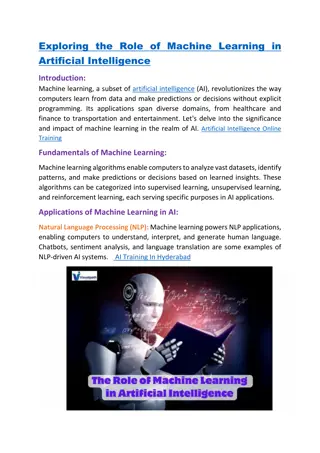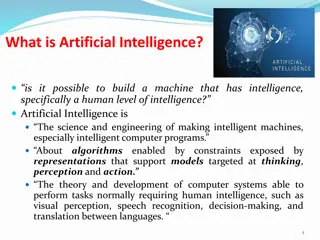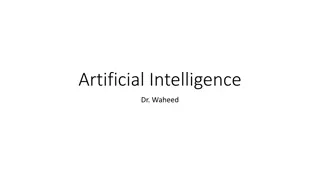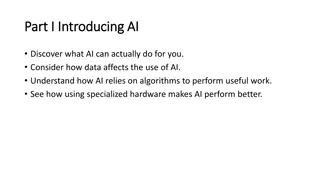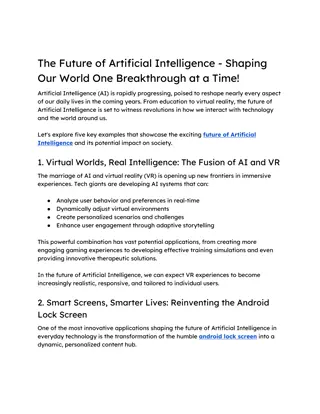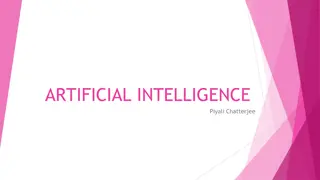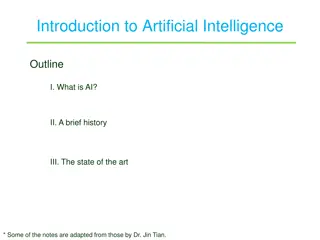Artificial Intelligence: A Modern Approach Textbook Overview
Explore the leading textbook in Artificial Intelligence used worldwide, covering topics like intelligent agents, problem solving, knowledge and reasoning, planning, uncertain knowledge, learning, communication, robotics, and the future of AI. With rich content and resources, including images and links, delve into the fundamental concepts of AI presented in a comprehensive manner.
Download Presentation

Please find below an Image/Link to download the presentation.
The content on the website is provided AS IS for your information and personal use only. It may not be sold, licensed, or shared on other websites without obtaining consent from the author.If you encounter any issues during the download, it is possible that the publisher has removed the file from their server.
You are allowed to download the files provided on this website for personal or commercial use, subject to the condition that they are used lawfully. All files are the property of their respective owners.
The content on the website is provided AS IS for your information and personal use only. It may not be sold, licensed, or shared on other websites without obtaining consent from the author.
E N D
Presentation Transcript
ARTIFICIAL INTELLIGENCE Russell and Norvig ARTIFICIAL INTELLIGENCE: A Modern Approach 7/12/2022 1
Fourth edition, 2020 older also OK The leading textbook in Artificial Intelligence, used in 1500 schools in 135 countries and regions Basic theory, understanding 7/12/2022 2
Youtube: AI a modern approach Dan Klein, Peter Abbeel Berkeley Video: http://aima.cs.berkeley.edu/ https://www.youtube.com/watch?v=t ONNlv6osG4&list=PL5cz44VCrscV rzSJ9ptlybpWyKdIypvPj 7/12/2022 3
Berkeley Course http://aima.cs.berkeley.edu/ https://aimacode.github.io/aima-exercises/ Exercises Exercise 1.1 // exam Q Define in your own words: (a) intelligence, (b) artificial intelligence, (c) agent, (d) rationality, (e) logical reasoning. 7/12/2022 4
Contents Part I Artificial Intelligence 1 Introduction 2 Intelligent Agents Part II Problem Solving 3 Solving Problems by Searching 4 Informed Search and Exploration 5 Constraint Satisfaction Problems 6 Adversarial Search Part III Knowledge and Reasoning 7 Logical Agents 8 First-Order Logic 9 Inference in First-Order Logic 10 Knowledge Representation 7/12/2022 5
Contents Part IV Planning 11 Planning 12 Planning and Acting in the Real World Part V Uncertain Knowledge and Reasoning 13 Uncertainty 14 Probabilistic Reasoning 15 Probabilistic Reasoning Over Time 16 Making Simple Decisions 17 Making Complex Decisions Part VI Learning 18 Learning from Observations 19 Knowledge in Learning 20 Statistical Learning Methods 21 Reinforcement Learning 7/12/2022 6
Contents Part VII Communicating, Perceiving, and Acting 22 Communication 23 Probabilistic Language Processing 24 Perception 25 Robotics Part VIII Conclusions 26 Philosophical Foundations 27 AI: Present and Future Data mining 7/12/2022 7
Contents Part I Artificial Intelligence 1 Introduction Check exercises for all sections 2 Intelligent Agents Types of agents see Wikipedia, Roomba https://en.wikipedia.org/wiki/Intelligent_agent Part II Problem Solving 3 Solving Problems by Searching search problem, (Pac-man) solution, state space, graph/tree depth-first, breadth-first uniform-cost search 7/12/2022 8
Contents 4 Informed Search and Exploration heuristics (estimate to goal) greedy search (most promising) A*, f(n) = g(n) + h(n) h less than true, optimal bidirectional (if), common 5 Constraint Satisfaction Problems 6 Adversarial Search Part III Knowledge and Reasoning . 7/12/2022 9
Wikipedia The intelligence of machines and the branch of computer science which aims to create it. Major AI textbooks define the field as "the study and design of intelligent agents." John McCarthy, who coined the term in 1956, defines it as "the science and engineering of making intelligent machines. (Turing first?) The field was founded on the claim that intelligence can be simulated by a machine. Artificial intelligence has been the subject of breathtaking optimism, has suffered stunning setbacks and is today an essential part of the technology industry, computer science and IS. 7/12/2022 10
Ethics, movies Ethics of artificial intelligence: if a machine can be created that has intelligence, could it also feel? If it can feel, does it have the same rights as a human being? Movies: A.I. (ethics, savior), a servant (R2D2 in Star Wars), a comrade (Lt. Commander Data in Star Trek), an extension to human abilities (Ghost in the Shell), a conqueror (The Matrix), a dictator (With Folded Hands), an exterminator (Terminator, Battlestar Galactica) and a race (Asurans in "Stargate Atlantis"), Blade Runner (human/AI), Alita, battle agent Introduce new concepts in AI-human relations 7/12/2022 11
Future? Ray Kurzweil has used Moore's law to calculate that computers will have the same processing power as human brains by the year 2029, and that by 2045 artificial intelligence will reach a point where it is able to improve itself at a rate that far exceeds anything conceivable in the past (superintelligence), a scenario that science fiction writer Vernor Vinge named the technological singularity. Edward Fredkin argues that artificial intelligence is the next stage in evolution. Cyborgs = merging humans and machines. 7/12/2022 12
Areas of AI Deduction, reasoning, problem solving Knowledge representation Planning Learning and data mining Natural language processing Motion and manipulation Perception Social intelligence Creativity General intelligence 7/12/2022 13
Approaches to AI Cybernetics and brain simulation Traditional symbolic AI Sub-symbolic AI Kismet Sophia socia robot 7/12/2022 14
Tools of AI research Search and optimization Logic Probabilistic methods for uncertain reasoning Classifiers and statistical learning methods Neural networks Control theory Specialized languages 7/12/2022 15
AI performance optimal: it is not possible to perform better strong super-human: performs better than all humans (chess) super-human: performs better than most humans (Dota2) sub-human: performs worse than most humans (open door) superintelligence: in general better than humans, like in chess but overall 7/12/2022 16
